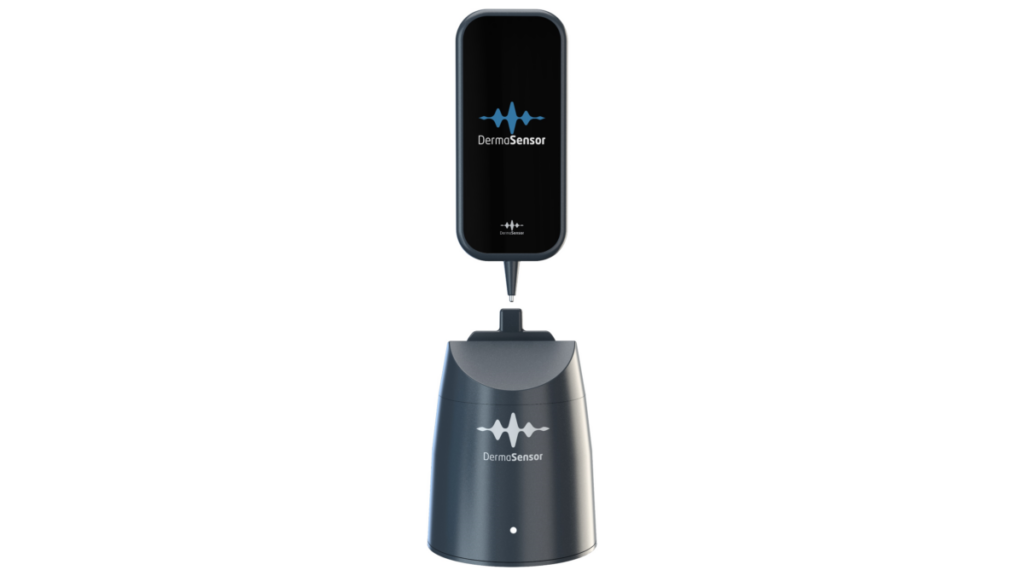Skin cancer is the most common form of cancer in the US, with diagnoses including basal and squamous cell carcinoma as well as melanoma. Melanoma is projected to be the most common cancer in the US by 2040, and over 4.3 million adults are treated for basal and squamous cell carcinomas yearly.
Some people are at higher risk for developing skin cancers (e.g., those with fair skin, light eyes and with a family history of skin cancer), but it can affect anyone as the most common cause is overexposure to UV rays from the sun or tanning beds.
Over 200,000 primary care physicians in the US can detect and refer skin cancers. Equipping them with an objective diagnostic device will support quick point-of-care assessment of suspicious skin spots.
DermaSensor is a health-technology company focused on developing non-invasive tools to better equip primary care physicians for skin cancer detection.
The company recently presented a pooled analysis from clinical studies of their DermaSensor skin cancer detection device at the American Academy of Dermatology (AAD) 2023 Annual Meeting. The results presented were from two of DermaSensor’s four clinical studies that were submitted to the US Food and Drug Administration (FDA). What makes DermaSensor’s results extraordinary is that they mark the first successful clinical study for any non-invasive skin cancer detection device intended for primary care physician use.
Back in May 2021, DermaSensor announced that their skin cancer detection device was granted Breakthrough Designation by the FDA based on study results that demonstrated its ability to detect skin cancers. The DermaSensor is currently under further review by the FDA so it is not yet allowed for sale in the US.
DermaSensor Clinical Trial Results Show High Sensitivity in Identifying Suspicious Lesions
The DermaSensor device is a handheld tool that uses spectroscopy and algorithms to evaluate patient skin lesions for cancer within seconds. A physician first identifies the lesion on the patient’s skin, and gently touches the tip of the DermaSensor to different parts of the lesion. The device’s tip uses photon scattering (light reflections) and records the way in which photons are reflected from the skin’s cellular and sub-cellular structures. Malignant lesions have been found to scatter light differently than benign lesions.
The reflected light is subsequently analyzed by built-in technology to provide information about the lesion to physicians immediately through a proprietary DermaSensor algorithm. The algorithm analyzes the photon reflections and returns results to “investigate further” or “monitor” the lesion. Data scientists have used thousands of spectral samples from confirmed cancerous or non-cancerous lesions to train the machine-learning algorithm.
Two clinical studies were conducted to evaluate the performance of the DermaSensor device in detecting skin cancer — the DERM-ASSESS III and DERM-SUCCESS studies. Over 2000 suspicious skin lesions were biopsied by 32 study centers across the studies, and analyses were pooled to evaluate the device performance. Overall, the device had a sensitivity of 94 percent for correctly identifying 338 high-risk lesions (where sensitivity can be defined as the number of positive cases detected out of a total pool of positive cases). Specificity was at 23 percent for correctly identifying low risk lesions (specificity demonstrates how many negative cases are identified out of the total negative cases).
Additionally, no safety issues regarding the device have been reported.
In the pivotal DERM-SUCCESS study, the device met the endpoint of having higher sensitivity than physicians for detecting all common skin cancers. Twenty-two primary care study centers demonstrated that the device had 96 percent sensitivity for all skin cancers in a primary care setting. The device specificity was 21 percent for correctly classifying benign skin lesions biopsied by study physicians. The NPV (negative predictive value) was 97 percent and the PPV (positive predictive value) was 17 percent, meaning that one in six lesions with a positive result from DermaSensor was cancerous.
RELATED: Renuvion Dermal Handpiece by Apyx Medical Gets FDA Clearance for Wrinkle Reduction
Broadening Access to Reliable Skin Cancer Assessments
The aim of DermaSensor is to enable access to quick and effective skin cancer checks. DermaSensor is currently available for sale in Australia, which has the highest skin cancer rates in the world.
“DermaSensor’s technology will help primary care physicians detect cancerous skin lesions and refer those patients appropriately to a dermatologist,” stated Dr. Jane Grant-Kels, the last author of the study publication and Professor at the Department of Dermatology at the University of Connecticut Health Center and Medical School, in the press release.
Dr. Grant-Kels adds that prompt referrals to dermatologists can minimize patient mortality and morbidity and reduce overall healthcare costs.
The global skin cancer diagnostics market is anticipated to reach $5.48 billion by 2028 from $3.36 billion in 2021 at a compound annual growth rate (CAGR) of 7.2 percent, according to The Insight Partners.
Another notable player in the field includes Michelson Diagnostics Ltd. (MDL) that designs and manufactures VivoSight Dx, an optical coherence tomography (OCT) skin imaging system. VivoSight Dx is a non-invasive imaging tool that can image over 1mm deep into the skin to make images of skin structural elements, pathology and vascularity.












Join or login to leave a comment
JOIN LOGIN